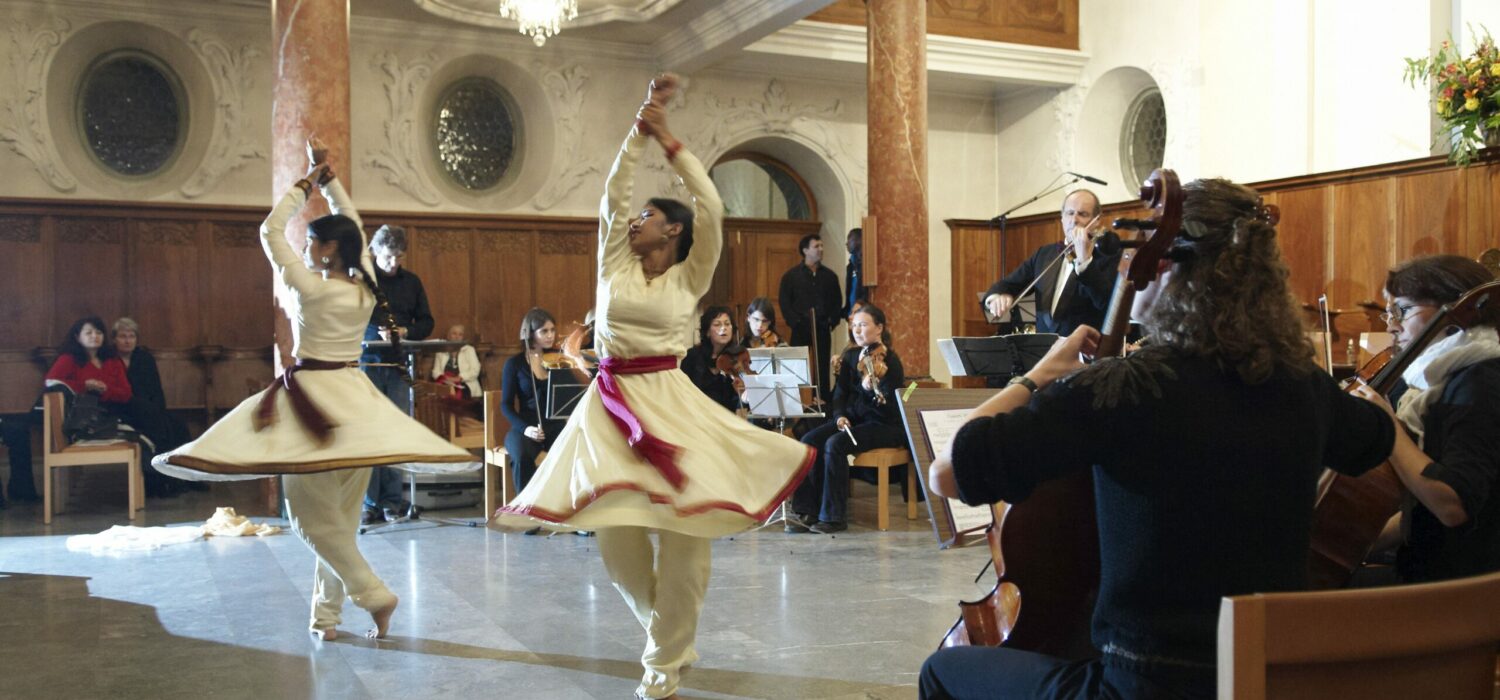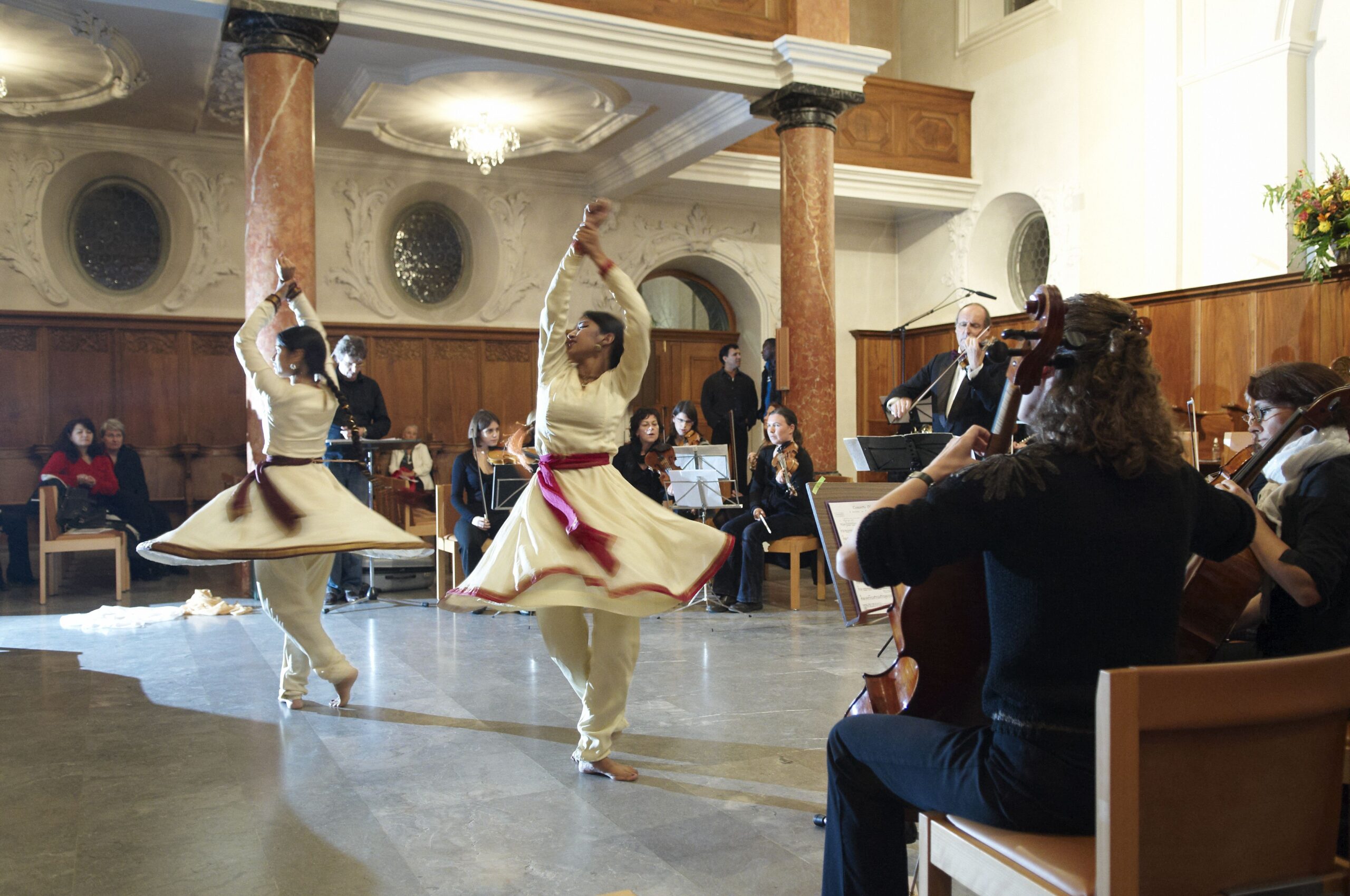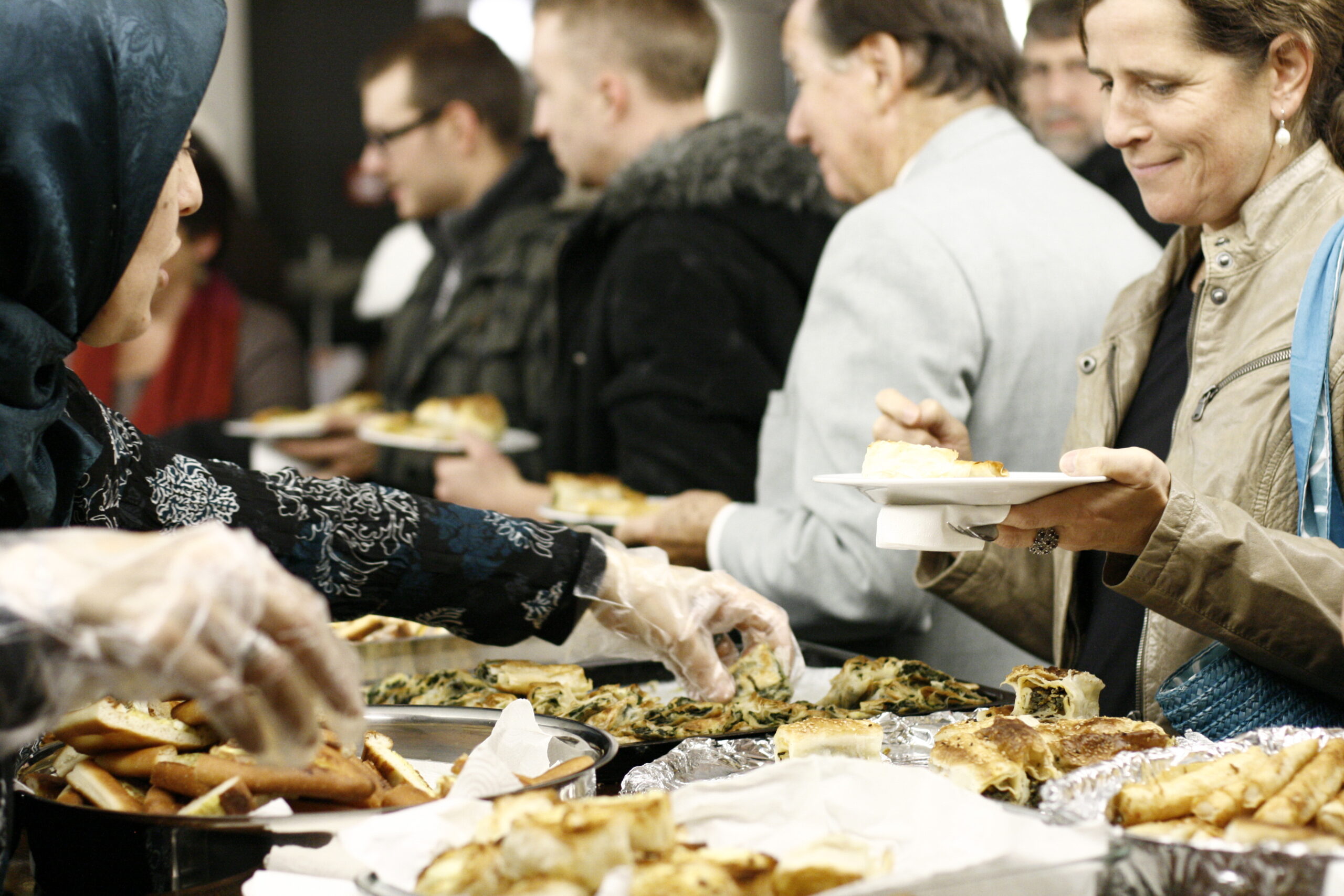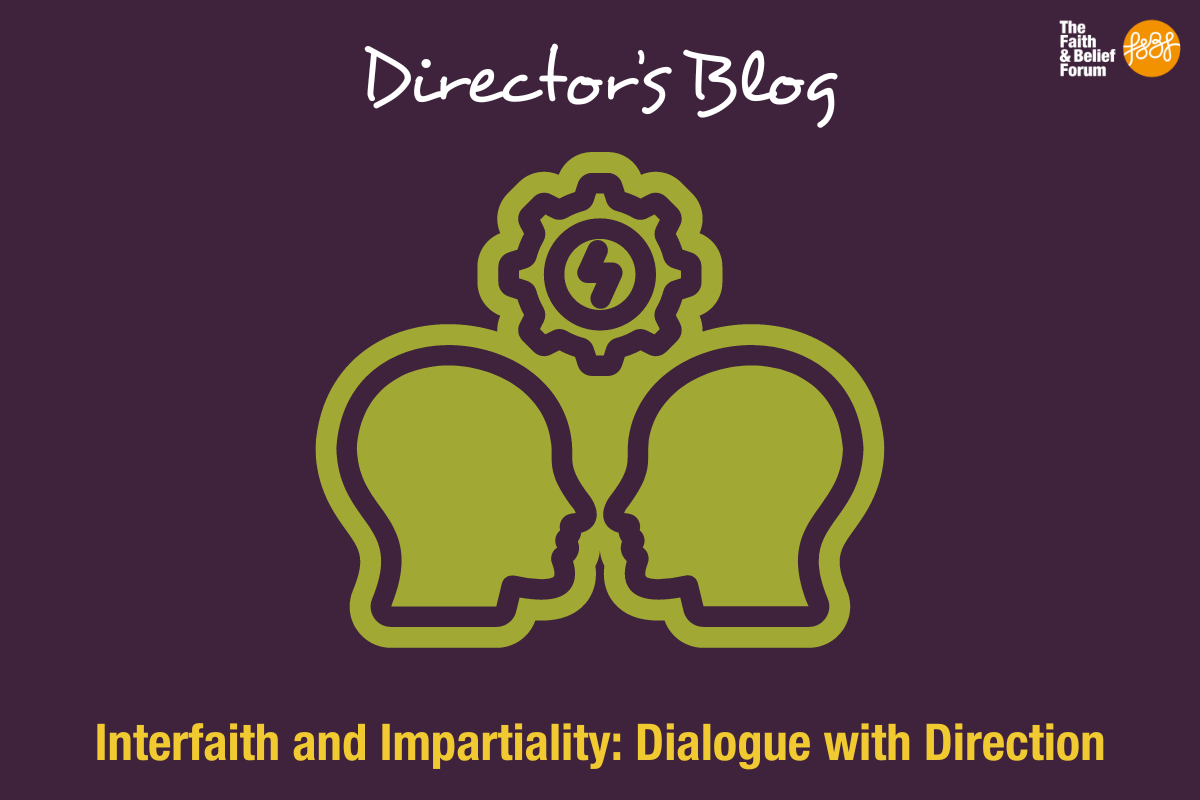
Menu
Menu

01 / 11 / 23

By Mark Fox, a trustee of The Faith & Belief Forum.
Mark shares his experiences and insights to compare the interfaith scenes in Switzerland and the UK.
Britain and Switzerland were amongst the first countries to introduce a “Religions Week”, which is now held every year in many countries. I’ve attended these events in both countries. There are some interesting similarities and differences between them.
Over the past two years, as part of my research on inter-religious dialogue, I have attended a number of events as part of the Swiss ‘Week of Religions’. This gave me the opportunity to compare it to the UK’s Interfaith Week, which I have attended for many years. The differences between the two events highlight some of the contrasts in the Swiss and British religious landscape.
There is no state established religion in Switzerland, the first Swiss “Week of Religions” took place in 2007 and was organised by IRAS-COTIS, an NGO founded in 1992, without direct government involvement. Surprisingly, in Great Britain, which has an official state religion, the first British Interfaith week only took place in 2008 – a year after Switzerland. [1]
While the Swiss NGO is an independent association, the UK central government and local authorities are actively involved in the UK Interfaith Week. However, the problem that the British government and others wanted to address was racism, not the promotion of religious dialogue. Interfaith Week was a concrete response to a UK government report entitled “Face to Face and Side by Side – A Framework for Partnership in our Multi Faith Society”.
The Swiss “Week of Religions” began differently, namely as a spontaneous initiative of the religious communities. Both “weeks” are part of a rapidly growing number of national “weeks” designed to promote inter-religious communication. In 2010, the UN sponsored the establishment of a World Week of Interfaith Harmony, held each February. The latest report lists national religion week activities in 26 member states. These include countries with a long history of tolerance and peaceful coexistence, such as Canada, but also those where religion remains a source of controversy and tension, such as Nigeria or Pakistan.
The differences between the Swiss “Week of Religions” and the British “Interfaith Week” arise from history and from the continuing cultural differences between them. In particular, the British nation state is involved, while in Switzerland the Confederation is absent. In the latter case, religion is divided between the cantons and the local towns and communes. Whilst I have attempted to compare the ‘British’ week to the ‘Swiss’ week, the comparison can only be approximate as the ‘Swiss’ week is affected by various local regulations.

At the opening of the “Week of Religions 2008”: Music as a cultural bridge on Sunday, November 2nd in the Church of St. Peter Zurich with the CHOR DER NATIONEN, an orchestra, percussion, organ, piano and Indian dance. Organizers: Interreligious Round Table in the Canton of Zurich, Evangelical-Reformed Church in the Canton of Zurich, Roman Catholic Church in the Canton of Zurich, Old Catholic Church in Zurich, Jewish Cult Community in Zurich, Jewish Liberal Community in Zurich, Association of Islamic Organizations in Zurich VIOZ, Swiss Buddhist Union in the Canton of Zurich. Picture Christoph Knoch
According to the websites of the NGOs in the two countries, the stated aims of the interfaith weeks in Switzerland and Great Britain are:
Switzerland
Great Britain
The organisers in both countries see religious peace as conducive to social cohesion beyond the members of the religions involved. In the case of the UK, the UK government has promoted ‘Interfaith Week’ as a specific response to racial tensions, as a larger proportion of UK immigrants come from Asia and Africa. In Switzerland, the IRAS-COTIS initially organised and supported the “Week of Religions” exclusively. The tensions between the various Christian denominations, which until recently represented a greater gulf in Switzerland than in Great Britain led to a lot of ecumenical content as well as the integration of newer minority religions.
Swiss cantons, that are responsible for religion, each have a different approach, varying from strong commitment to promotion of religion for social good in cantons such as Zurich, Basel or St. Gallen to no government involvement at all in cantons such as Geneva or Neuchâtel, adopting the French doctrine of Laicité. I have only met representatives of the communities or the cities at events of the week of religions, never the cantons themselves.

Week of Religions 2011 in Solothurn. Image: Sabrina Balmer
The Swiss Week of Religions and the British Interfaith Week overlap in the second week of November, with a few events on both sides. Even behind this similarity lies a difference in cultural approach. The timing of the Swiss event was chosen pragmatically in order to avoid overlapping with the holidays of all religions and the most important secular holidays as far as possible. Britons celebrate Remembrance Sunday each year on the first Sunday in November, with services across the country to honour the fallen of both world wars. The timing of Interfaith Week was chosen on an ideological principle: it should follow Remembrance Sunday to convey a religious message of peace.
Despite the historical differences in foundation and approach to religion, the programs of both institutions are broadly similar. In both there are interfaith services and dialogues, as well as events dealing with the different religions’ attitudes towards broader secular issues. These can range from predictable and uncontroversial issues, such as environmental issues, to more problematic issues, such as the moral dilemma of pacifism. Discussions on this topic took place this year in Zurich and Ashford, a town in southern England. Cultural events such as concerts, events involving different cuisines, and lectures explaining the religious significance of paintings or sculptures were held in both countries.
A larger disparity is found in the approaches of state and religion when it comes to social welfare. British religious institutions are actively involved in social welfare, but there is no direct equivalent of the Germanic doctrine of “Diakonie” as a coherent religious activity. A Day of Diakonie held in Zurich’s Grossmünster in 2021 was strikingly different from similar British events. While both religious and non-religious canton representatives participated, the discussions were held in two separate panels, one composed of religious only representatives and the other of secular representatives. A coffee break separated the two panels. Of course, this is just one example and other approaches may be followed elsewhere.
It is possible to identify local cultural idiosyncrasies at events in both countries. They can unwittingly show how inflexible old culture can be in adapting to new changes. This is not necessarily a negative, but organisers need to be aware of the hidden messages in the communication. An example of this is the inter-religious train journey in Graubünden, probably organized to overcome the practical difficulty of involving the religious centres of a sparsely populated area. It would be unlikely that such an event would take place in a similar area of the UK. The reason for this is that British railways are by no means a popular part of local identity, as is the case in Switzerland. In Britain, railways often evoke negative associations with rural isolation. This is due to the mass closure of little-used routes in the 1960s, which is still controversial 60 years later. Thus, a similar activity can unintendedly convey a different message in each country.
Week of Religions 2013 in Bern.
Another example of the importance of understanding the interplay between the activities of Religious Week or Interfaith Week and local cultural differences is shown by comparing programs in Scotland with those in England and Wales. The former has significantly more events related to spirituality than other UK regions. This may be due to pre-Christian pagan and spiritual beliefs and customs that persist more strongly in Scotland and particularly the Scottish Isles than in the rest of Britain.
Both countries have a very uneven geographical distribution of events, which is due to population density, but not only [3]. As expected, Zurich and London will host the most events, but the exact national total and location cannot be given with certainty. In Switzerland, IRAS-COTIS did not list any events for the Week of Religions 2022 for 7 cantons on their website, but this does not mean that no events took place. Since there is no direct government funding, partners in the cantons and municipalities can only be asked to coordinate and list the events taking place in their area. Successful persuasion can depend on network collaboration at an individual level. Paradoxically, in Geneva and Neuchâtel, where the cantonal separation of religion and state is strictest, events were listed
In the UK, Interfaith Week events are less dependent on region or population focus than on religious diversity. In Wales, with a population of over three million in an area just over half the size of Switzerland, events were held in only two cities. The 2021 UK census ranked Wales as one of the least diverse regions in the UK outside of these two cities. In the Swiss Confederation, on the other hand, the incoming refugees, the greatest source of religious diversity, are distributed among the cantons according to the weight of the existing cantonal populations. This has led to a relatively widespread spread of the newer religions, with the number of adherents being:
Week of Religions 2018 in Nidau.
There has been some concentration in some areas due to immigration of people of non-Christian religious affiliations, but the distribution is much more even than in the UK. The proportion of Muslims in the population in Switzerland, even in areas with a greater concentration such as Bern or Aargau, is around 6% of the population. In the UK, migrant populations are much more concentrated both nationally and in local areas. The percentage of Muslim populations in Switzerland and the UK is about the same (6.5%), but in the UK 76% of Muslims live in just four regions (London, West Midlands, North West and The Humber). The local concentration is even greater:
The UK and Switzerland are similar in that they rely on local connections and enthusiasm for interfaith events, despite greater government involvement in the UK. This can be illustrated by the differing involvement of two neighbouring London ‘boroughs’, the British equivalent of communes. Ealing and Hillingdon both have a population of just over 300,000 and are similarly religiously diverse: Hillingdon is 17% Muslim and 13% Hindu, Ealing is 16% Muslim and 9% Hindu, and both also have a mix of other religions and ethnicities. Hillingdon had ten events during Interfaith week due to an active arm of the Interfaith network, Ealing only one.
Attendance lists are not kept in either Switzerland or Great Britain. There is a legitimate concern that fear of surveillance could act as a deterrent. However, anonymized click counts could be done discreetly. Curiously, in Switzerland, where privacy protection has a greater tradition, pre-registration is often required, which is not required in the UK. However, I have never been turned away from an event for not registering and only once was my name checked against a list. Of course, interfaith programming should not be guided by numbers alone, and a simple listing of numbers without considering variables such as whether it is a city or a rural area, will provide little information. However, it would be a start to building a comparative database to find out, for example, whether purely social events are more popular or less popular than lectures, how daytime attendance compares to after-hours attendance, and so on.
Week of Religions 2016 in Bern. Image: Adrian Ackermann
Switzerland and the UK were among the first countries to introduce national religion weeks, and interfaith activity is growing rapidly. Both countries have launched very different initiatives that have emerged from different approaches to religious engagement, albeit only a year apart. Britain has a centralized national government and a single established religion. Switzerland is a federal state in which religious matters are largely regulated at the cantonal level and relations between the state and religions vary widely. While in Great Britain the state is actively involved, in Switzerland there is no federal level activity and cantonal participation varies considerably. In both countries, however, the organizers broadly share the same intention: to promote interreligious dialogue and understanding between religions, albeit with some differences. A good start has been made in both countries, but there is still more to be achieved.
First published on www.religion.ch, the website of IRAS-COTIS promoting exchange, dialogue and cooperation between people of different religions in Switzerland.

16 / 02 / 24

15 / 02 / 24